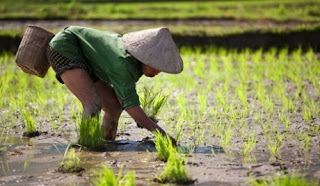Photo: marana.ru via VOR
“Preferential Treatment for Rice Cropping in Japan To be Abolished. “
– Farmers to be Victimized First by Abe Administration –
This measure indicates that it is farmers that will be victimized first by the Abe administration. In other words, it is the local region. People living in urban areas might think that seemingly, they will not suffer so much damage, but they cannot hope for safe food.
Destruction of rice, the staple food of
Japan, means that Japanese will become slaves to foreign capital at the level
of food. As shown in an example of
bringing bread and milk as school lunches after the war, Japanese agriculture
has been destroyed gradually over time, because bread or spaghetti cannot be made
with naked barley native to Japan.
Destruction of rice will complete the process of agriculture
destruction. Simultaneously, total
colonization of Japan will be finished.
Masatoshi
Takeshita
December
2, 2013
English translation of the Japanese version
of The Voice of Russia – November 30, 2013 –
The Japanese government
has decided to abolish the protective policy for production of rice, the staple
food of Japanese, which has been adopted for a long
period of time. It is likely that subsidies provided to rice producers will be reduced to half from fiscal year 2014 and subsidies themselves will never be offered from fiscal year
2018.
A system has functioned smoothly, in which
the authorities have bought up rice from farmers at a high price, while
strictly deciding the rice production quota.
This measure was taken to protect rice producers in the country and prevent
a decline in market price due to shrinking rice consumption. Why has the government decided to abolish
such measure now?
Mr. Andrei Fesyun, an expert of Russian
Highest Economy Academy, points out: “It is related to participation of the
negotiation process of TPP by the Japanese government.” He also says:
“Decision of
Japanese government has two aspects: political and economic
aspects. These two are closely connected
with each other. First, economically,
once Japan becomes a TPP member country, much cheaper agricultural products are
imported from foreign countries. This may
cause rice producers at home to go bankrupt.
On the other hand, Japanese high-tech products will increase
competitiveness in the foreign market.
The Japanese government is prepared to sacrifice
domestic agriculture in order to have giant businesses and high-tech economic
sectors survive.
As for another aspect of politics, the
influence of farmers as voters has rapidly been decreased. Fewer and fewer people want to work in rice
fields with high rubber boots on. Naturally,
the need to listen to such people has been decreased. Taking this into consideration, the ruling Liberal Democratic Party would probably
have thought that it did not need to have much
expectation for farmers’ votes, while it was
first and most important to get support from voters
living in urban areas.
The LDP wants to “win exceptional
cases beneficial for Japanese agriculture before final
approval of the rules while participating in the TPP negotiation process. However, Mr. Feshun considers it is probably
impossible.
“This is flowery
language which is often used before making an important decision when it
is necessary to tighten a belt. It is in
the same situation where you should not tell a sick person that he/she has a serious
disease. On such an occasion, you are
supposed to say, “Everything will go well.
You will get better soon.” In TPP every member country stands on the same
foundation in every field including agriculture. In this case, Southeast
Asian countries such as Malaysia and Thailand are in an advantageous position. Japan will have an
advantage in the high-tech industry and automobile industry. It can make a far greater profit than by
growing rice. The problem is how far Japan will victimize the national
agriculture. However, this
problem has already asked a more psychological question directly toward the
Japanese society. The consumption of
rice in Japan has decreased over several decades. Despite this, rice is an integral part of the
Japanese diet.”
Rice cropping has always been the most important
sector in Japanese economy. Therefore, a decision to abolish preferential treatment for production
of rice, the staple of Japanese, will have an extremely important meaning.

Leave a Reply